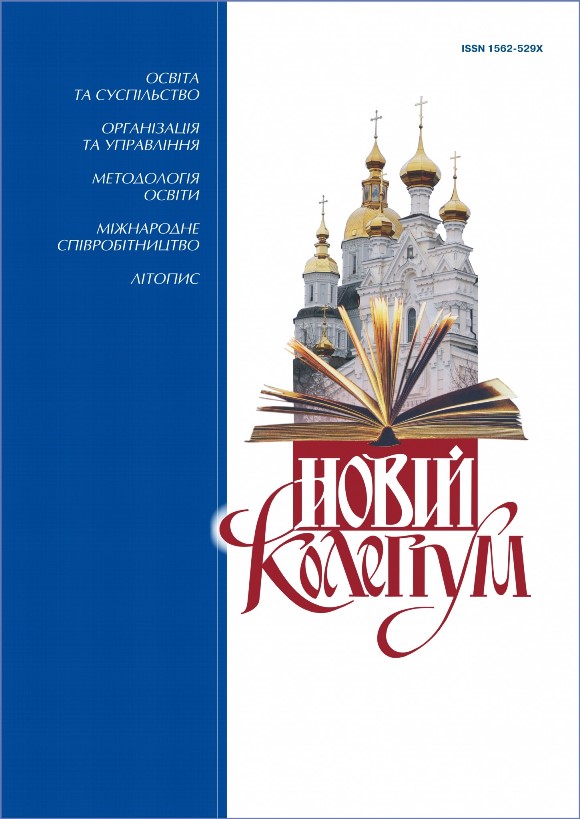Peculiarities of Assessment of Knowledge of Higher Education Students in the Conditions of Distance Learning (on the Example of Historical Disciplines)
DOI:
https://doi.org/10.30837/nc.2023.3.101Keywords:
distance education, historical disciplines, educational process, assessment, learning outcomesAbstract
The article is devoted to the analysis of the main forms of assessment of knowledge and skills acquired by higher education students in the study of historical disciplines in the context of distance learning, which can provide a quick correction of the educational process towards its improvement. Attention is drawn to the fact that assessment should be considered not only as a means of recording the results of students' learning activities, but also as a critical analysis of the educational process in order to improve it. It is shown that it is important to introduce an assessment system that would provide an adequate assessment of the student's work, knowledge and skills acquired during the course of study and provide the teacher with timely information to adjust the educational process. The author concludes that the transition to distance learning has given rise to a rethinking of the forms and methods of teaching, motivation of students' cognitive activity, and verification of their achievement of the expected learning outcomes. In order to make the most of the online environment, teachers need, on the one hand, to neutralize the main problems of this format, and on the other hand, to use the result to adjust, improve and update the educational process. To achieve this, control should be systematic, provided with theoretical support for students' learning activities in terms of mastering knowledge and skills and constant feedback between the teacher and the student. If we expect higher education students to become creative people who think critically and solve real problems, then all forms of control should be aimed at developing and assessing these skills. This will not only increase confidence in the higher education system, but will also have a positive impact on the quality of the educational process and the professional development of students.
References
Александрова В. В., Білоконь К. С., Савченко А. В. Організація самостійної роботи студентів як засіб творчого розвитку особистості майбутнього фахівця // Актуальні проблеми сучасних лінгвістичних досліджень та застосування інноваційних технологій викладання мов у вищій школі нефілологічного профілю : матеріали міжнар. наук.-практ. конф. (м. Дніпро, 25 жовтня 2018 р.). Дніпро, 2018. С. 6 – 12. [Електронний ресурс]. Режим доступу: https://er.dduvs.in.ua/bitstream/123456789/3202/1/1.pdf
Гриняк А. Б. Підсумковий контроль знань студентів-правників в умовах дистанційного навчання // Нове українське право. 2021. Вип. 4. С. 131 – 137. [Електронний ресурс]. Режим доступу: http://newukrainianlaw.in.ua/index.php/journal/article/view/91/82
Гушинець Н. О. Інноваційні методи і форми проведення семінарських занять. [Електронний ресурс]. Режим доступу: http://conf.vntu.edu.ua/humed/2008/txt/gushinez.php
Єфремов С. В. Роль семінарського заняття у навчальному процесі середньої та вищої шкіл // Проблеми фізичного виховання і спорту. 2011. №. 3. С. 49 – 51. [Електронний ресурс]. Режим доступу: https://www.sportpedagogy.org.ua/html/journal/2011-03/11ysvahs.pdf
Зайченко І. Педагогіка : навч. посібник для студентів вищих пед. навч. закладів. 2-е вид. Київ : Освіта України ; КНТ, 2008. 528 с.
Наливайко О. О., Куцина К. А. Особливості оцінювання під час дистанційного навчання // Наук. записки кафедри педагогіки. 2021. Вип. 49. С. 35 – 41. [Електронний ресурс]. Режим доступу: https://doi.org/10.26565/2074-8167-2021-49-04
Ненько, Ю., Іващенко, О. Дистанційне оцінювання здобувачів вищої освіти в умовах пандемії COVID-19 // Освіта. Інноватика. Практика. 2023. 11(1). С. 22 – 27. [Електронний ресурс]. Режим доступу: https://doi.org/10.31110/2616-650X-vol11i1-004
Олійник Н. Ю. Оцінювання знань студентів в середовищі LMS Moodle // Третя міжнар. наук.-практ. конф. «Теорія і практика використання системи управління навчанням Moodle» (Київ, 21 – 22 травня 2015 р.) [Електронний ресурс]. Режим доступу: https://2015.moodlemoot.in.ua/course/view.php?id=129
Полторацька В. В., Каданер О. В. Контроль і оцінювання навчальних досягнень студентів в умовах модульно-рейтингової системи навчання // Pedagogics, psychology, medical-biological problems of physical training and sports. 2009. [Електронний ресурс]. Режим доступу: https://www.sportpedagogy.org.ua/html/journal/2009-03/09pvvrsl.pdf
Тарасенко М. І. Місце і значення контролю як мотивація до успішного навчання студентів у ЗВО // Молодий вчений. Серія: Пед. науки. 2019. № 6 (70). С. 352 – 354. [Електронний ресурс]. Режим доступу: https://molodyivchenyi.ua/index.php/journal/article/view/2602/2586
Тестовий контроль знань студентів у системі Мооdle: навчально-методичний посібник / Д. М. Бодненко, Л. О. Варченко, О. Б. Жильцов ; за заг. ред. О. Б. Жильцова. Київ : Київ. ун-т ім. Б. Грінченка. 2012. 112 с.
Холод І. В., Лисенко Т. А., Штангрет Г. З. Оцінка успішності здобувачів вищої освіти у персоналізованому дистанційному навчанні // Академічні візії. 2023. Вип. 17. https://academy-vision.org/index.php/av/article/view/218

